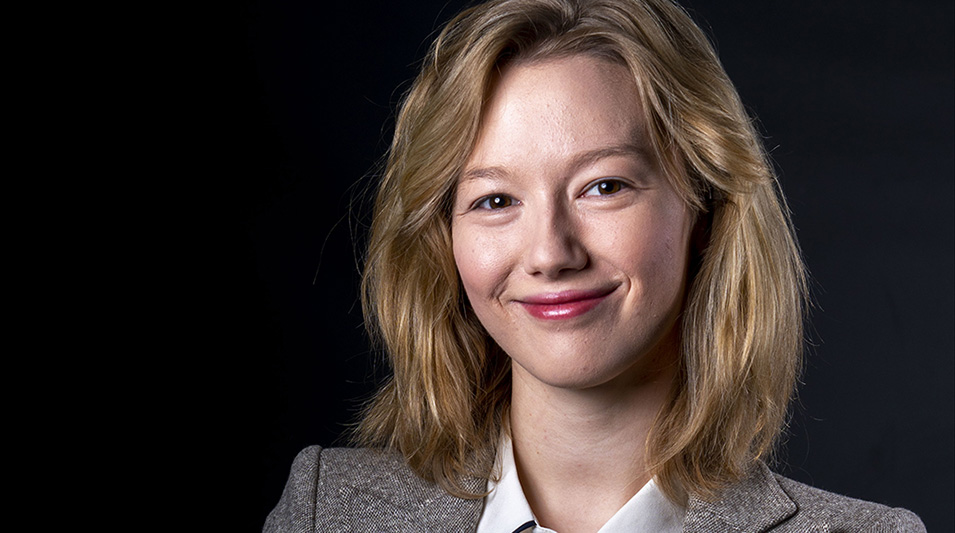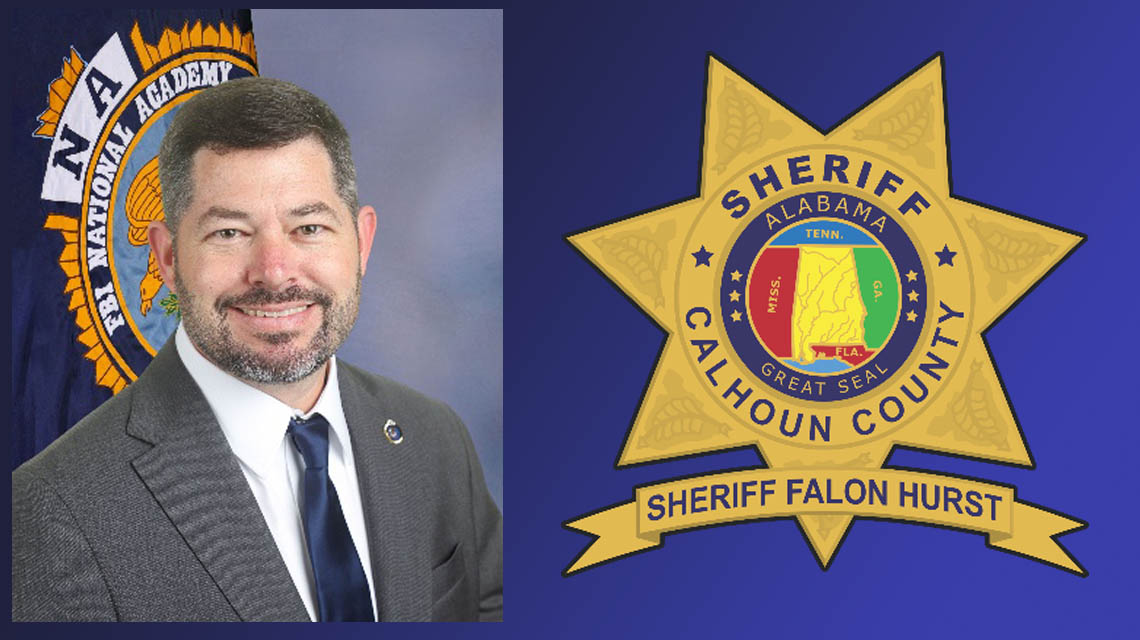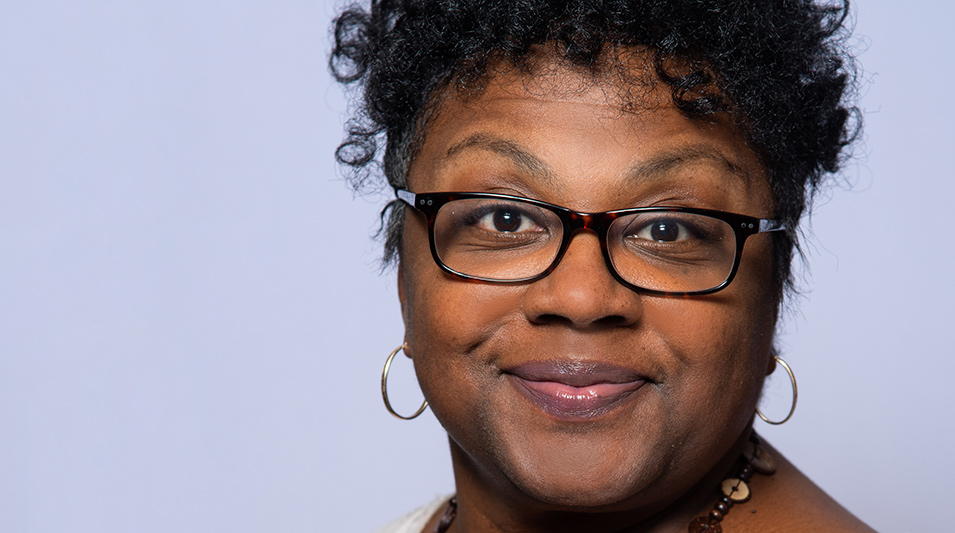A passion and curiosity seeded in childhood is taking JSU’s digital footprint to the next level.
Lead Interactive Designer Sebastian Mendez in the Office of Marketing and Communications uses various web and social media platforms to tell the story of JSU in a way that is both engaging and informative. With the use of video production, web design and marketing technologies, Mendez brings the vibrancy of JSU’s campus community to life.
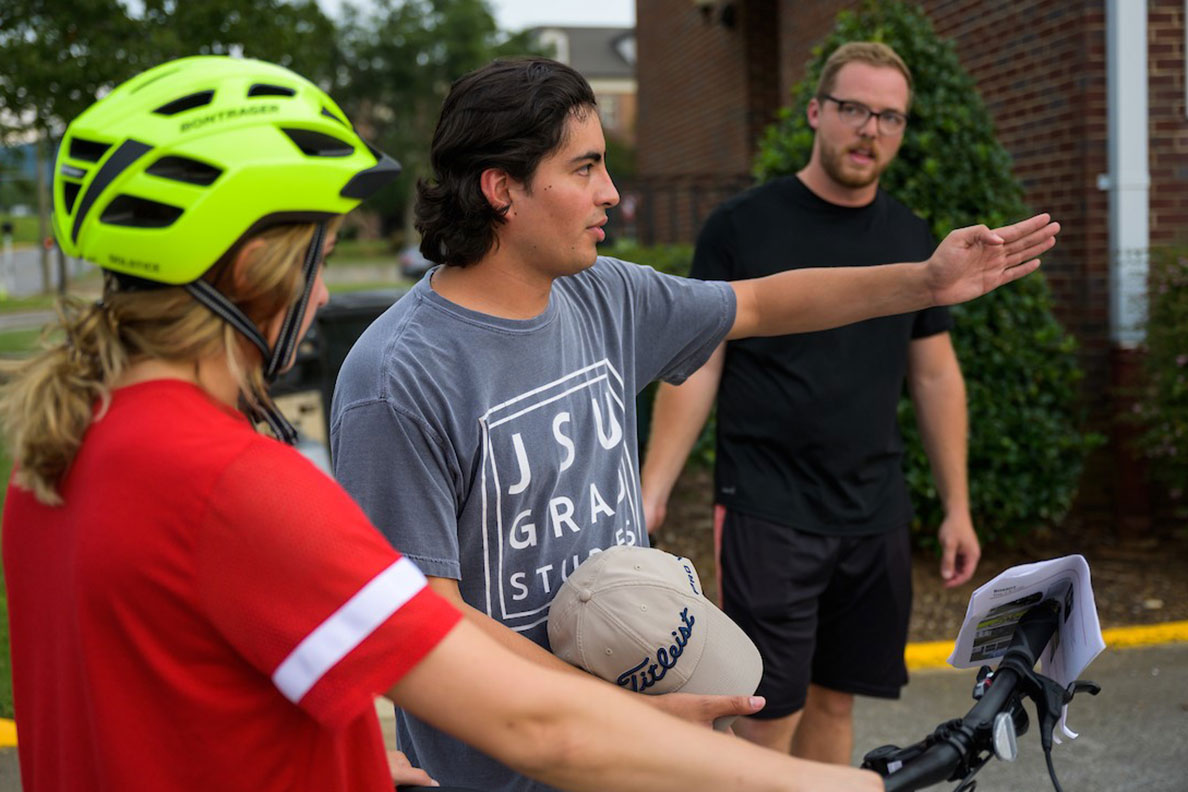 Sebastian Mendez, center, scopes out a video scene with coworkers.
Sebastian Mendez, center, scopes out a video scene with coworkers.
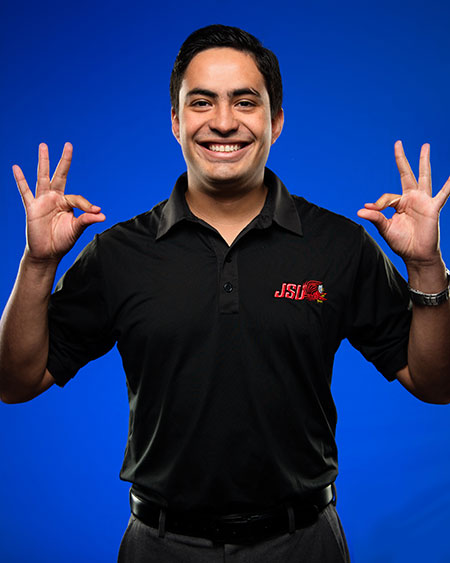 A native of Guatemala, Mendez came to JSU in August 2011 by way of the International House. His initial plan was to take all he had learned from various English as a Second Language programs and share that knowledge with those back home. But his experience at JSU changed his career goals.
A native of Guatemala, Mendez came to JSU in August 2011 by way of the International House. His initial plan was to take all he had learned from various English as a Second Language programs and share that knowledge with those back home. But his experience at JSU changed his career goals.
“It opened up my views of the world,” he said, “and I decided to pursue my profession internationally”
Four years later, Mendez graduated with a bachelor’s in graphic design and landed a job with JSU Marketing and Communications. Among some of his professional achievements, he is particularly proud of a virtual tour he directed that shows a 360-degree perspective of campus to admissions counselors, international recruits, and prospects with audio and mobility impairments. He produces Cocky TV, a video blog series about JSU’s student life, and helped produce “The Call,” JSU’s new national 30-second spot.
“Despite the problems related to social media, the internet is here to stay, and it will continue to evolve, faster and broader,” Mendez said. “One of the greatest attributes of social media platforms is they don’t require that much capital to build an audience. However, you need to create content that matters. As Bill Gates stated in 1996, ‘content is king’.”
Mendez serves on JSU’s new Hispanic Opportunity Partners in Education (HOPE) committee. Led by Arlene Flores in the Office of Admissions, its goal is to recruit and retain LatinX students. His personal background as a Latin American immigrant and a JSU alum makes him a valuable member of the recruitment team.
But Mendez is using his talent for design and digital marketing for more than increasing JSU’s reach. He’s also uniting communities while educating others about his shared culture that quietly thrives on campus.
He has helped organize National Hispanic Heritage Month, which continues through October 15.
Celebrated annually from Sept. 15-Oct. 15, National Hispanic Heritage Month recognizes the contributions of Hispanic and Latino Americans to our nation’s history, traditions and culture. Throughout the history of the United States, Hispanics have been viewed as a singular group, but events like Hispanic Heritage Month intend to highlight the differences within the culture.
“We eat different meals,” Mendez said. “We have different ways of expressing ourselves. We interact differently. There are similarities but we Hispanics and Latinos are from different parts of the globe and have different cultural backgrounds."
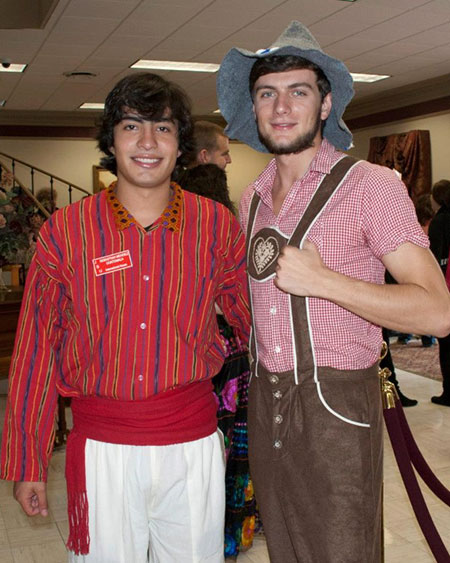
Mendez representing Guatemala at the UN Day Tea, along with Alex Korsunski from Germany...
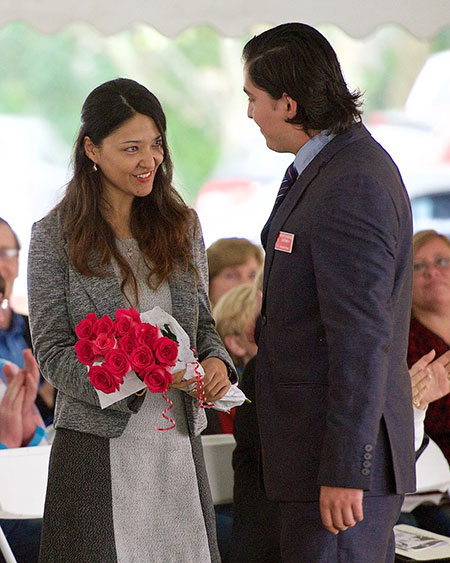
...and presenting roses to International House Director Chandni Khadka Walsh at the UN Day Tea.
Events like the National Hispanic Heritage Month teach that the heritage brought into this nation by Hispanics is broader than just a language.
The celebration also provides a springboard for conversations about diversity.
“I am really satisfied with all the diversity and inclusion initiatives at Jacksonville State,” said Mendez. “These activities really make me feel part of the community and allows me to recognize the differences that myself and my Hispanic/Latin constituents have that make us unique in the USA and the world.”
Diversity is a necessary watchword for all campuses, including JSU. However, defining it among Hispanics can be a challenge.
“Immigrants who came to the continental United States came from all parts of the Old World,” Mendez said. “It’s not an easy task to identify who fits in the Hispanic/Latin category. Factors like skin color or last names are not sufficient evidence that someone can be of Hispanic or Latin American descent.”
That’s why Mendez helped initiate the Hispanic or Latin Alumni Association (HOLA). Once 70 members join HOLA it will become officially recognized by JSU Alumni Relations as an Alumni Association chapter. The group is open to not only Hispanic alumni, but anyone interested in learning more about Latin culture.
In terms of attracting more Hispanic/Latino students, Mendez has a few ideas. After all, he’s one of JSU’s most visible, even if it is from behind the camera or computer screen.
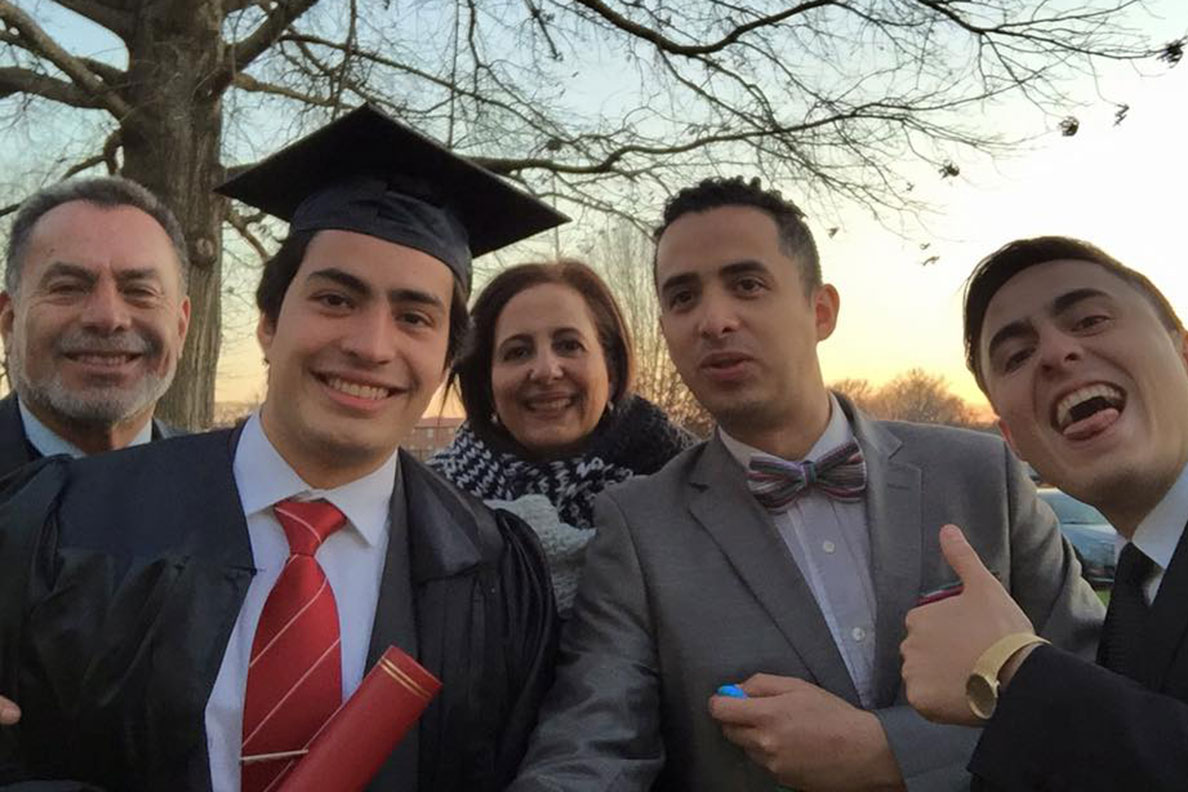
Mendez with his family at graduation.
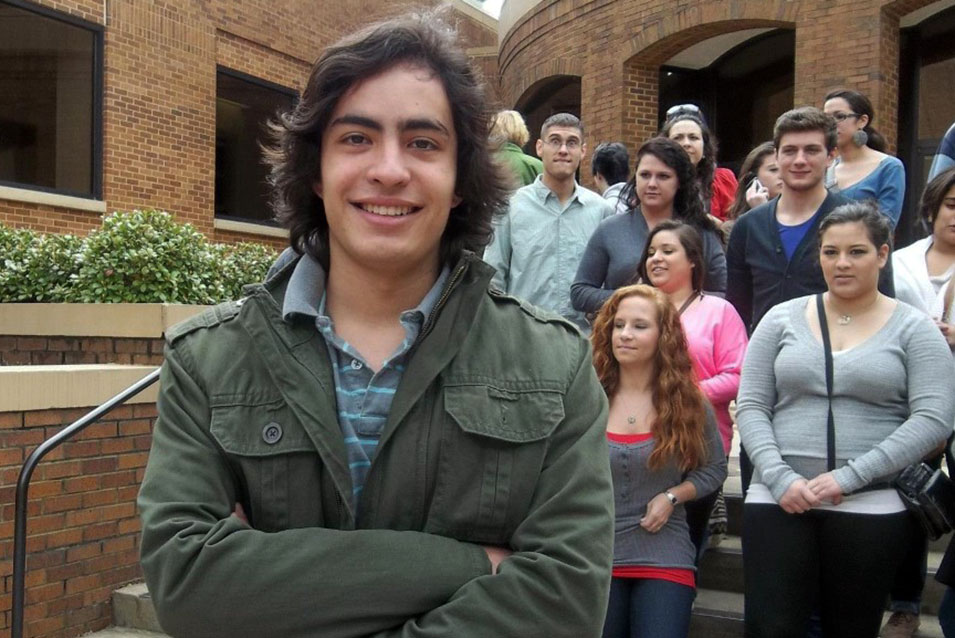
Mendez with fellow students on a field trip to the Birmingham Civil Rights Institute.
Mendez suggests spending extra time helping Hispanic students navigate the admissions system, as most of them are first-time freshman. In some cases, students, as well as parents, are unfamiliar with the process of attending an American college. JSU Admissions is now offering special recruitment sessions in Spanish during campus tours and on Preview Day, as well as hosting special events for Hispanic families throughout the region.
And, of course, Mendez said the International House needs to continue to serve as an advocate for students from all parts of the world.
“We need to continue to encourage our alumni and invite them to give back and get involved,” Mendez said, “JSU is a great place. I have had so many opportunities here – no one told me to stop, they just said ‘go for it.’ I love JSU and would like to see more people of all backgrounds come here – not just from around the world but from Alabama’s rural communities. As we say in the International House, ‘Know One Another and You Will Love One Another’.”



 A native of Guatemala, Mendez came to JSU in August 2011 by way of the International House. His initial plan was to take all he had learned from various English as a Second Language programs and share that knowledge with those back home. But his experience at JSU changed his career goals.
A native of Guatemala, Mendez came to JSU in August 2011 by way of the International House. His initial plan was to take all he had learned from various English as a Second Language programs and share that knowledge with those back home. But his experience at JSU changed his career goals.



